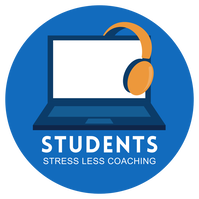Welcome to the blog
The Students Stress Less Coaching blog has a wealth of FREE resources, ranging in topics from executive function skills to exam prep. Enjoy.
 Can We Learn to Outsmart Our Brain to Relieve Stress? The mind can be a bit strange. There is a great deal we will never understand about how it operates in its complexity, but the last decade or so of research in neuroplasticity has resulted in good news for those of us in behavioral sciences. It appears that humans have control over some brain functions. We can change unwanted behaviors simply by changing old perceptions and beliefs. This is huge for managing stress, but…it is not so simple. At the very basic level we should understand this: The mind uses past experiences, memories, sensations, and thoughts to form current perceptions, judgements, decisions, and opinions. This works against us, if we don’t intentionally change some things. The above statement (read it again) explains many of our behaviors around and reactions to the stresses we face each day. It explains why we give up on forming new habits and responses. It explains why we try to stop destructive behaviors, but go back to them. It explains why we have brief motivation for a goal, but may lose it eventually. And, it explains why we get overloaded with the stresses of daily living and give in to unproductive coping skills. We act on stress with little or no intention. We allow it to sink us. We think about stress with little attention given to needing to eliminate or change our triggers. We fail to connect with a sense of intentional change. Therefore, we revert back to old, unsuccessful ways of handling our stresses. It’s just easier for us and for our brains. So how do we fix this? Well, this part is not easy. It's not easy because it requires gaining the ability to on purpose, with intention, ignore the programmed biases, old beliefs and preconceptions about stress and life that we subconsciously refer to when we approach change, stress, and the forming of new habits. It means purposely interrupting the lazy brain while inadvertently changing its chemical make-up, and tapping in to the huge thing called self-awareness. The Awareness Triangle (left) is a concept that explains each moment we live, we experience thoughts, sensations, and emotions. We will call this a “state” of being for now. When we are aware of our current, in- the-moment thoughts, emotions, and sensations and we control our urge to revisit old ways, we can focus on making healthier decisions, choices, and engagements. We do this in an opportunistic space in time called “open space”. This is the exact moment(s) we get to: stop what we are doing, stop ineffective thoughts, safely and effectively consider new perspectives, make better choices, calm our anxieties, and regulate our bodies. It is in this space that we can intentionally bypass a stimulus – something that calls for us to respond with old destructive behaviors, negative thoughts, in grained negative reactions - and form new, alternative thoughts and actions that may bring us success. It is where we relate to our thoughts instead of from our thoughts, and become focused and highly aware of what is important to us at the moment and how it is that we want to successfully cope with stress. This is where magic happens! (Goldstein, Elisha, The Now Effect, 2012). If we are trying to change how we respond to a co-worker who brings out the worst in us, we can choose a new type of engagement. If we are trying to lose weight and want to give up after two weeks of not losing, we can go to the "open space" and clearly think about alternatives instead of simply giving up and going for the ice-cream. And, if we are anxious, scared, or intimidated in social situations, and we feel this overwhelming urge to run, when we are present, in the moment, and intentional with our thoughts, we can regulate our bodies in distress, calm our anxious minds, and exercise more flexibility when making decisions so that we do not run; we stay and work through the anxiety and fear. Even though while we are present in this space we may not feel instant relief, immediate gratification or sudden change in thoughts, with practice and the telling ourselves that thoughts are only thoughts, not facts, we eventually gain greater focus and better control of how to respond to daily stress (Goldstein, Elisha, The Now Effect, 2012). We change our harmful thoughts, our old patterns of behavior, and our self sabotaging ways and we feel with more intensity as we connect yet bypass uncomfortable feelings. Just ask: "Where am I right now?" This simple question will bring our minds back to that open space that we use to create effective positive coping to stress. It reminds us of what is most important in the moment (less stress, sticking to a diet, responding to others with kindness) for the future. Answering this question routinely throughout the day as we face “life”, helps us gain clarity to relax and become more powerful over our choices to manage stress. We can outsmart our brain. Still interested in the brain or want to know more? Have a look… https://blog.bufferapp.com/10-surprising-facts-about-how-our-brain-works Author: Lori Bender, MSW Professional Life and Wellness Coach Founder of Carolina Lifestyle Coaching www.carolinalifestylecoachingandconsulting.com https://www.facebook.com/carolinalifestylecoachingandconsulting/ [email protected] (540) 256-2589
1 Comment
3/3/2017 04:46:02 pm
this blog is very interesting and informative. When and where do you do your research or is just already in your heady? Mighty Good stuff! I hope a lot of people read this, like it, and heed it!,,
Reply
Leave a Reply. |
|
